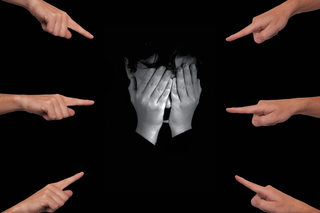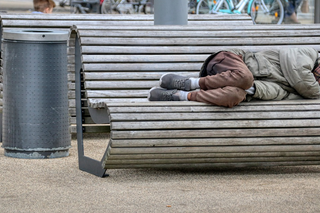Politics
Victim-Blaming in the Pelosi Attack
Politics is a new reason we blame victims for their fates.
Posted November 8, 2022 Reviewed by Michelle Quirk
Key points
- There are three known causes of victim-blaming, and politics would make four.
- Victim-blaming can help us to feel more control over our own lives and to feel the world is a more just place.
- Victim-blaming in a political context can also simply serve political goals.

One of life’s ironies is that when bad things happen to someone, many of us automatically blame the victim, at least to some degree. It can literally add insult to injury. Examples include blaming someone for being robbed, shot, assaulted, raped, killed, sick, poor, unemployed, homeless, bullied, or hurt in an accident or natural disaster (Stalder, 2018).
Of course, how common something is cannot justify it. But why is victim-blaming so common? It seems so cruel. Victim-blaming researchers have stated that “blaming those most deserving of compassion may appear paradoxical if not perverse” but that “it can serve an important psychological function” (Harber et al., 2015).
There are generally three reasons for why we blame victims. After the recent attack on Paul Pelosi and the spread of victim-blaming conspiracy theories about the attack, I’m also reminded that politics can be a reason unto itself.
Reasons for Victim-Blaming

To generally understand why we blame victims, consider the discomfort that observers might feel when witnessing someone’s suffering. How terrible it is that an innocent person was robbed or assaulted. How sad to see a hard-working parent lose their home. Oh wait—maybe they’re not as innocent or hard-working as I first thought. Yeah—that’s it. Whew. OK; I feel a little better now.
Such a turnaround in thinking is an oversimplification of how victim-blaming works. But the point is that discomfort can be reduced for most of us if we can find even a partial reason to bring the responsibility for what happened back onto the victim. And what if we ourselves were somehow the cause of the victim’s suffering?
- Personal guilt: Sometimes our own actions (or inaction) can hurt someone or lead to a negative outcome for them. As we reflect on our behavior, we might feel guilt, regret, or ego threat. Finding some reason to blame the victim can help to alleviate such feelings. We can believe the victim had it coming. Or in the case of offending someone, we can say, “Don’t be so sensitive.”
- Belief in a just world: The most researched reason for victim blaming is the common belief in a just world, a simple place where good things happen to good people and bad things happen to bad people (Lerner, 1980). When bad things happen to good people, as often happens, our worldview is shaken. But if we can dig up some reason that shows the victim was not as good as we first thought, or might even be partially responsible for what happened, then we can keep believing in that kind of world.
- Need for control: A primary component of mental health is believing we can control our lives, especially the negative outcomes, even if we cannot (Taylor, 1989). Suppose my neighbor is smart and decent and yet lost his job and even ended up homeless, and so even though I am smart and decent, can I end up that way, too? Maybe I won’t be able to prevent it any better than my neighbor could. My sense of control may start to fade. Oh, wait—maybe my neighbor is not as smart as I thought. He must have done something wrong at work. And because I’m a smart worker, I won’t lose my job. Such thinking can return some sense of control.
Pseudo-Reasons for Victim-Blaming
Of course, sometimes our neighbors can mess up at work. Sometimes assault victims’ actions can contribute to their unfortunate outcomes. But, even in such cases, victim-blamers usually exaggerate such possibilities. And the fact that she could’ve done something differently that night that might’ve altered the outcome cannot justify blaming her—the attacker is at fault. Another potential reason for victim-blaming is because the victim-blamer is not a nice person, but I don’t officially cite such a reason because it’s sort of like victim-blaming the victim-blamer.
Politics as a New Reason
After Paul Pelosi, husband of Democratic House Speaker Nancy Pelosi, was recently attacked for apparently political reasons, baseless conspiracy theories quickly circulated from some Republicans that the incident was “an inside job, a lover’s quarrel or worse” (Karni et al., 2022). Such responses led fact-check outlets to explain that “any suggestion that Pelosi hired [the attacker] as a prostitute or that Pelosi knew him in any capacity is false” (Gore and Spencer, 2022).
On the surface, such conspiracy theories seem completely politically motivated. It’s a way to “score political points” or to minimize political fallout. Members of any political group may feel the urge to find fault in any arguments or accuser against their group, although spreading wild misinformation about a victim may take that urge to a different level.
We may also be able to map the Pelosi story back onto some of the three classic reasons for victim-blaming. For example, some Republicans might feel collectively responsible for the attack because of the rhetoric of some high-profile members of their party. In that case, finding some reason to blame Pelosi can relieve a sense of guilt. I want to note that, of course, one person’s actions cannot reflect guilt of a whole party, but members of the party might still feel the need to defend.
In Sum
Paul Pelosi, like any elderly victim of a physical assault, deserves compassion. The fact that some are putting any degree of blame on him for what happened is unfortunate but also consistent with a vast literature on victim-blaming. It also seems very political during an extremely divisive time in our country. Reducing these divisions is a monumental task, but, on an individual level, there are ways to reduce victim-blaming. In particular, if you’re feeling discomfort from watching someone suffer, share your feelings with close others before firmly deciding why the tragedy befell that victim (Harber et al., 2015).
References
D'Angelo Gore and Saranac Hale Spencer, “Conservative Figures Spread Baseless Claims About Attack on Paul Pelosi,” Factcheck.org, November 1, 2022, https://www.factcheck.org/2022/11/conservative-figures-spread-baseless-….
Kent D. Harber, Peter Podolski, and Christian H. Williams, “Emotional Disclosure and Victim Blaming,” Emotion 15 (2015): 603.
Annie Karni et al., “How Republicans Fed a Misinformation Loop About the Pelosi Attack,” New York Times, November 5, 2022, https://www.nytimes.com/interactive/2022/11/05/us/politics/pelosi-attac….
Melvin J. Lerner, The Belief in a Just World: A Fundamental Delusion (New York: Plenum, 1980).
Daniel R. Stalder, The Power of Context: How to Manage Our Bias and Improve Our Understanding of Others (Amherst, NY: Prometheus Books, 2018).
Shelley E. Taylor, Positive Illusions: Creative Self-Deception and the Healthy Mind (New York: Basic Books, 1989).




